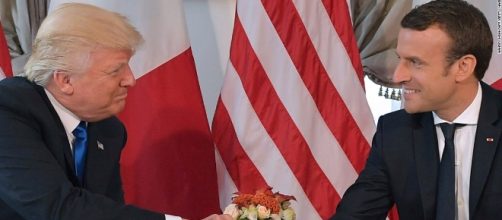In 1917, President Woodrow Wilson thought he had won re-election the year before with an isolationist policy that had kept his country out of World War I and with the motto of "United States First." He decided to send U.S. troops to participate in the conflict that bled Europe. His intervention, by the dispatch of some two million soldiers of whom some 125,000 lost their lives, was fundamental to help the victory of the allies.
A century later, Donald Trump, another president who came to power promising to put "America first" and is considered isolationist in international politics, attended a parade in Paris on the occasion of the national day of France.
This year the parade also served to commemorate the centenary of the entrance of the U.S. into World War I.
At the invitation of the French president, Emmanuel Macron, Trump contemplated from a place of honor the military parade in the Champs Elysees, where there was a special participation of troops and military aircraft of France. But the presence of the President in Paris has much more to do with the present and the future than with past histories.
Unexpected allies
Donald Trump and the President of France, Emmanuel Macron, do not seem to be natural allies. During the French presidential campaign, Trump did not hide his sympathies for Macron's rival, the far-right Marine Le Pen, nor spared criticism of the European Union.The French ruler, for his part, is an open defender of European integration and has not hesitated to question Trump.
The first meeting between the two leaders, at the end of May in Brussels, was marked by a strange moment: on greeting, Macron took the hand of Trump for several seconds refusing to let go despite the apparent discomfort of this. "We must demonstrate that we will not make small concessions or even symbolic," the French president explained about that episode in a later interview.
Common interests
Shared interests between Trump and Macron indicates there is no previous ideological coincidence or obvious sympathy. Both governments share a number of important common interests which, moreover, now seem to bring them closer due to phenomena foreign to bilateral relations such as Brexit - United Kingdom of the European Union - which opens the opportunity to develop a better relationship.
In an article in The New York Times, it is stated that Macron's invitation may give the U.S. president a brief respite from his internal political difficulties but is also for his host an opportunity to establish France as the main point of contact of Trump with Western Europe.


